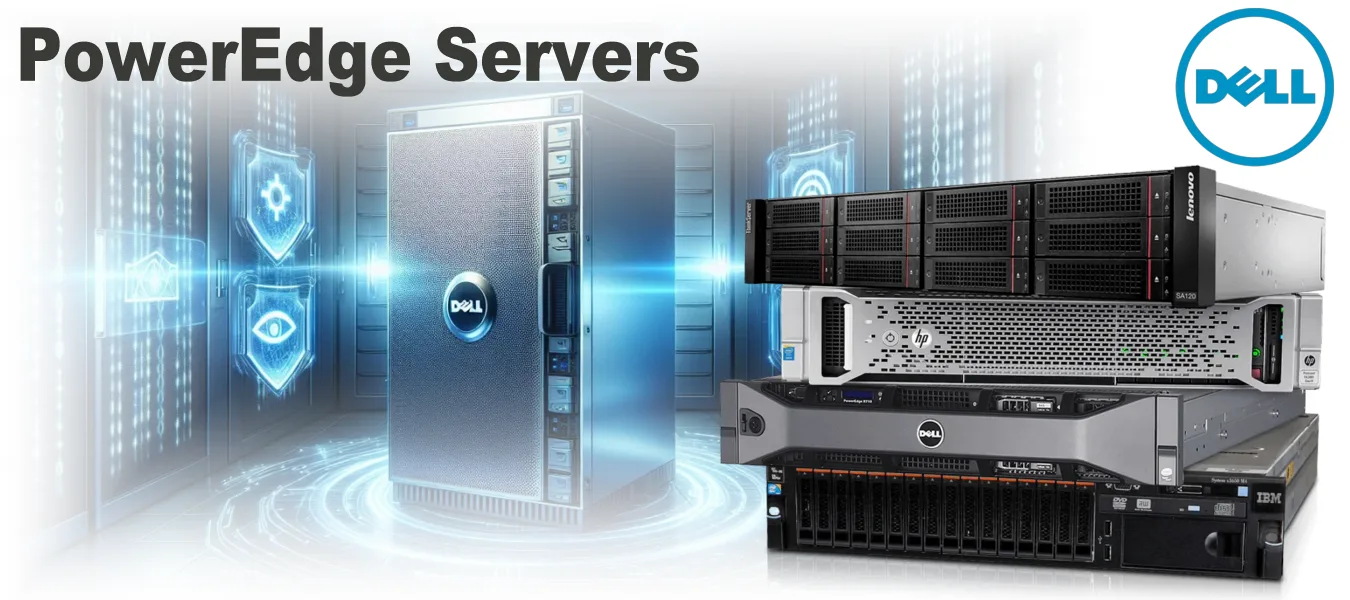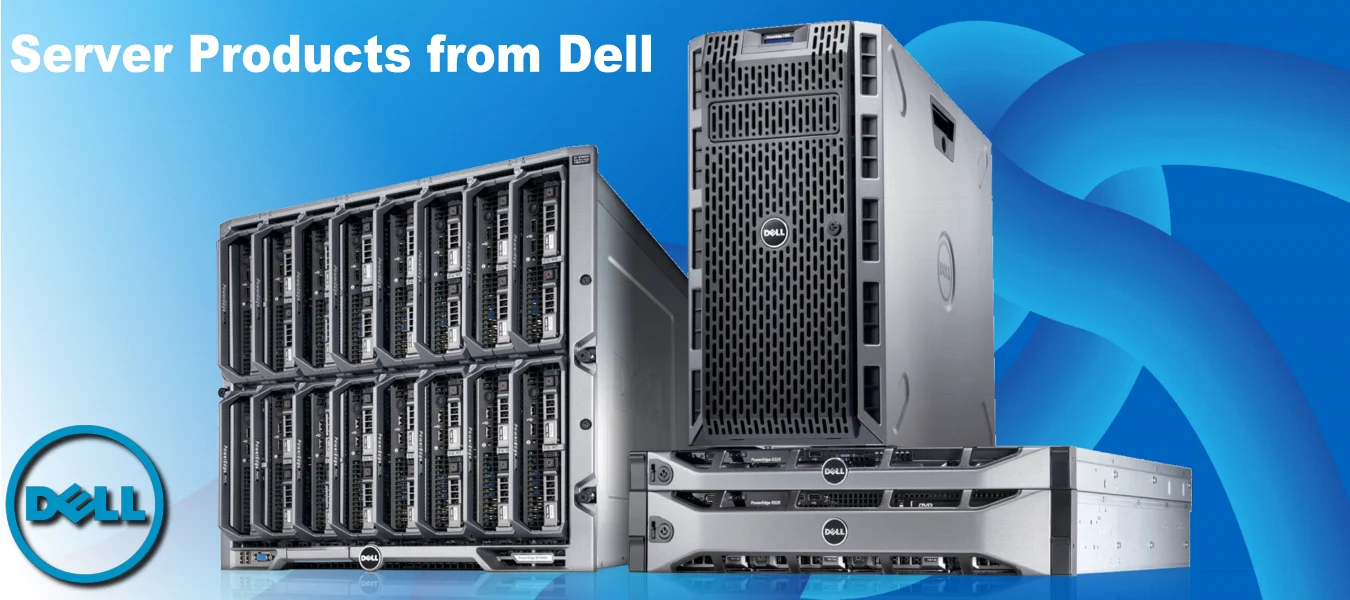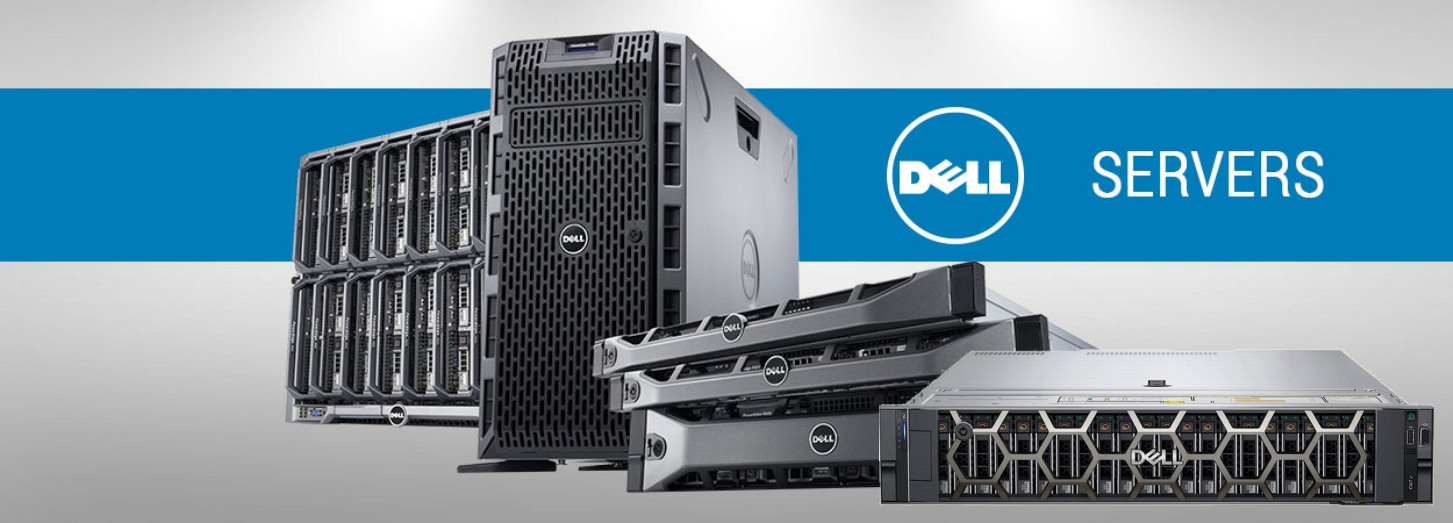Dell Server Dubai
One of the major advantages of Dell servers in Dubai is their flexibility in processing capabilities. PowerEdge servers offer a range of processor options, including Intel Xeon and AMD EPYC, allowing businesses to select configurations that align well with their workload requirements. This selection of processors gives companies the computational strength necessary for tasks like general data processing, high-performance computing, and machine learning applications. With these options, Dell enables companies to optimize performance while managing power consumption, which is essential for industries that prioritize both processing speed and energy efficiency.
Dell’s PowerEdge servers reflect a highly adaptable and comprehensive server design approach, crafted to meet diverse business needs. They deliver powerful computing capabilities, streamlined management options, and scalability features, making them a popular choice across business types and sizes. The innovation behind Dell servers is clear in their ability to meet demands for high data processing, AI workloads, and other evolving enterprise requirements. The PowerEdge series is engineered to provide solutions that easily integrate into a wide variety of IT infrastructures.

dell servers dubai
Memory customization is another key feature in Dell’s PowerEdge lineup. These servers come with configurable memory options, enabling businesses to tailor memory capacity to their specific needs. This adaptability is vital for fields that handle extensive databases or run applications requiring considerable memory. Dell ensures that their servers can handle memory-intensive operations, such as data analysis or enterprise resource planning (ERP), commonly used in finance, healthcare, and manufacturing sectors. The ability to scale memory as needed prevents businesses from needing complete server overhauls, allowing them to expand incrementally as their data requirements grow.
Data storage is an area where Dell PowerEdge servers truly excel. Storage configurations support various RAID setups, providing not only data redundancy but also faster data retrieval speeds. These storage features are crucial for organizations that place a premium on both data protection and performance. Offering a range of hard drive and SSD options, Dell servers serve as ideal solutions for managing critical information, including customer data and proprietary content. RAID options ensure data security, helping to protect against potential data loss if a drive fails, and enable storage scalability for businesses with substantial data requirements.
When it comes to server management, Dell has embedded the Integrated Dell Remote Access Controller (iDRAC) across the PowerEdge series. This controller streamlines management tasks, enabling IT administrators to remotely monitor, deploy, and update servers without needing to be physically present. For companies that operate servers in multiple locations, iDRAC provides a major advantage by allowing efficient, real-time monitoring and management. Additionally, iDRAC can identify and resolve issues proactively, often before they impact server performance or cause interruptions. This remote capability is crucial for companies aiming to simplify IT management and minimize downtime, ultimately boosting productivity.
Dell’s commitment to advancing technology is also evident in its recent expansion into AI and machine learning. In 2024, Dell released new AI-focused servers equipped with Qualcomm Snapdragon X series chips, featuring neural processing units (NPUs) designed specifically for AI-related workloads. This architecture enables companies to handle AI tasks more efficiently. Additionally, Dell launched servers compatible with Nvidia’s Blackwell chips, ideal for businesses investing in machine learning and deep learning. These developments highlight Dell’s recognition of the growing importance of AI, supporting businesses that rely on complex data models and decision-making algorithms.
Cooling technology is another area where Dell PowerEdge servers shine, particularly as data centers grow denser and demand for energy-efficient cooling rises. Dell has incorporated liquid cooling technology in certain PowerEdge models, especially those used for high-performance and AI tasks. Liquid cooling offers an energy-efficient alternative to traditional air cooling, allowing servers to sustain high performance without overheating under intense workloads. This innovation is particularly beneficial for data centers looking to lower energy costs while supporting powerful, high-demand applications.
Dell PowerEdge servers also prioritize robust security features. In today’s cybersecurity landscape, Dell’s approach to server security is multi-layered, with hardware and firmware protections such as secure boot, system lockdown, and BIOS recovery. These features help ensure that, even if a breach occurs, core components remain secure, and systems can be restored quickly. Additionally, Dell servers support encryption and advanced authentication measures to meet regulatory standards like GDPR and HIPAA, providing protection against unauthorized access and data breaches, keeping sensitive information secure.
Scalability is a defining feature of Dell servers, enabling businesses to grow seamlessly. As companies expand, their data and storage requirements naturally increase, and Dell PowerEdge servers are designed to accommodate this growth efficiently. The servers support hardware upgrades and virtualized environments, making scaling both easy and cost-effective. By providing ways to expand without the need for complete infrastructure overhauls, Dell helps organizations manage costs as they scale. This scalability is particularly valuable to growing companies, allowing them to build on their initial investment in Dell servers as their needs evolve.

dell poweredge server dubai
Environmental sustainability is another core focus for Dell, and PowerEdge servers are built with energy-efficient components to help reduce power consumption while maintaining high performance. This commitment to sustainability is evident in everything from the materials used in server construction to the energy-saving technologies within Dell’s server designs. The use of liquid cooling systems and energy-efficient processors reduces power needs, making PowerEdge servers an excellent option for companies focused on reducing their environmental impact.
Lastly, Dell sets itself apart through its comprehensive customer support, which includes on-site support, remote troubleshooting, and proactive maintenance services tailored to diverse business needs. For businesses that cannot afford downtime, Dell’s support team is a valuable asset, ensuring issues are resolved promptly. This level of support is especially advantageous for small to mid-sized businesses that may lack extensive IT resources. Dell’s dedication to customer care extends beyond the initial sale, fostering long-term partnerships to ensure that servers continue to meet the organization’s requirements over time.
In summary, Dell PowerEdge servers combine high performance, adaptability, and security to meet various business demands. With support for different processors and customizable memory options, they can handle a broad range of workloads. Their storage configurations offer both redundancy and speed, and management tools like iDRAC enable seamless remote control. Dell’s AI capabilities and liquid cooling technology showcase its dedication to innovation, while security features offer robust protection against cyber threats. Scalability options allow businesses to grow without complete system overhauls, and energy-efficient designs help organizations reduce their environmental footprint. Dell’s comprehensive customer support completes the package, making PowerEdge servers a reliable choice for businesses looking to build a resilient IT foundation.
Dell Server Categories
Dell Technologies offers a comprehensive range of servers under its PowerEdge line, designed to meet diverse business needs. These servers are categorized into three primary form factors: tower, rack, and modular.
Dell Tower Servers: Resembling traditional desktop computers, tower servers are ideal for small to medium-sized businesses. They provide a cost-effective solution with easy scalability, allowing organizations to expand their capabilities as needed. Their design facilitates straightforward installation and maintenance, making them suitable for environments without dedicated server rooms.
Dell PowerEdge tower servers are well-suited for small and medium-sized businesses, offering a balance of cost efficiency, performance, and expandability. These servers resemble traditional desktop computers, making them an ideal choice for businesses that lack dedicated server rooms. The tower models come in a variety of configurations, each designed to handle specific business workloads while supporting easy upgrades to memory and storage as needs evolve.
For example, the PowerEdge T150 is an entry-level tower server, perfect for handling everyday business tasks like file storage, email, and basic applications. It offers a straightforward setup, which is essential for small businesses without extensive IT resources. For businesses needing more performance, the PowerEdge T350 provides a step up in processing power and expandability. The T350 is suitable for growing organizations that may require more robust server capabilities to handle expanding applications and data volumes. PowerEdge tower servers offer versatile storage options, including support for SSDs and multiple hard drives, allowing companies to adjust storage capacity according to their needs.
Dell Rack Servers: Designed to be mounted within standardized racks, these servers are optimal for businesses requiring high-density computing power. Rack servers support efficient cooling and cable management, making them suitable for data centers and enterprises with substantial IT infrastructure. They offer enhanced performance and scalability, accommodating various workloads and applications.
Dell Modular Servers: Also known as blade servers, modular servers consist of multiple server modules housed within a single chassis. This design allows for shared power, cooling, and networking resources, leading to reduced operational costs and space savings. Modular servers are particularly beneficial for organizations requiring high scalability and flexibility, as they can easily adapt to changing workload demands.
Also known as blade servers, Dell’s PowerEdge modular servers offer a unique architecture that enables multiple server modules to fit within a single chassis. These modular servers share resources such as power, cooling, and networking, leading to greater operational efficiency and reduced costs. Modular servers are typically employed in enterprise environments and large data centers that need flexible and scalable computing power. By using shared resources, these servers are able to achieve a higher density of computing power per unit of physical space, making them a cost-effective solution for organizations requiring high-performance solutions that can adapt to changing workloads.
Modular servers offer the ability to scale quickly as organizations grow, making them ideal for businesses that want to future-proof their IT infrastructure. Dell’s modular servers support a variety of workloads, from general applications to high-performance tasks, and are often used in industries like finance, healthcare, and manufacturing, where rapid scalability and efficiency are critical. These servers allow companies to add computing power in small increments rather than investing in larger, more expensive upgrades.

dell server supplier dubai
AI and High-Performance Computing (HPC) Servers: Purpose-built for artificial intelligence, generative AI, and HPC applications, these servers come equipped with state-of-the-art security systems and diverse GPU options. An example is the PowerEdge XE9680, designed to handle demanding AI, machine learning, and deep learning workloads.
Edge Servers: Designed for deployment in edge environments, these servers bring computing power closer to data sources, reducing latency and bandwidth usage. They are ideal for applications requiring real-time processing.Dell PowerEdge edge servers are engineered to bring computing power closer to data sources, supporting real-time data processing and reducing latency and bandwidth consumption. These servers are ideal for edge computing environments where it’s essential to process and analyze data on-site rather than sending it to a central data center. Edge servers are particularly useful in industries that rely on IoT (Internet of Things) devices, such as retail, manufacturing, healthcare, and telecommunications.Edge computing is crucial in scenarios where quick decision-making is needed based on the data generated on-site, such as in factory automation, smart cities, and remote monitoring. By deploying PowerEdge edge servers, businesses can harness real-time insights and enhance operational efficiency. Dell’s edge servers offer a compact, durable design that’s easy to install in various environments, from remote locations to manufacturing floors. These servers often come with enhanced security features, ensuring that critical data remains protected even at the edge of the network.
Dell’s PowerEdge servers : Dell’s PowerEdge servers are engineered with a focus on performance, scalability, and security. They support a variety of processors, including Intel Xeon and AMD EPYC, to cater to different performance requirements. Memory configurations are flexible, allowing businesses to customize RAM capacity based on their specific needs. Storage options are diverse, supporting various RAID configurations to enhance data redundancy and performance.To streamline server management, Dell integrates the Integrated Dell Remote Access Controller (iDRAC) into its servers. iDRAC provides IT administrators with tools for remote deployment, updates, and monitoring, thereby simplifying server management tasks.In May 2024, Dell expanded its AI capabilities by introducing new AI-enabled PCs powered by Qualcomm Snapdragon X series chips, featuring neural processing units for advanced AI tasks. Additionally, Dell launched a new server compatible with Nvidia’s latest Blackwell chips, incorporating energy-efficient liquid cooling technology. These advancements underscore Dell’s commitment to integrating cutting-edge technologies into its server offerings.
Dell’s PowerEdge rack servers are designed for data centers and enterprises that need high-density computing in compact spaces. These servers are built to be mounted in standardized racks, which makes them ideal for data centers where maximizing space and cooling efficiency is a priority. Rack servers from Dell are optimized for scalability, meaning that businesses can add more servers as their computational and storage needs grow. They also offer exceptional performance for demanding workloads, whether for handling complex applications or running virtualized environments.
The PowerEdge R250 is an entry-level rack server, delivering powerful compute capabilities suited for general business applications and smaller workloads. It’s an efficient choice for organizations looking to add processing power without incurring significant operational costs. For those requiring even higher performance in a compact 1U design, the PowerEdge R450 offers improved processing power and exceptional value. This model supports multiple Intel Xeon processors and is suited for high-demand applications, including database management, virtualization, and more intensive data-processing tasks. Dell’s rack servers are commonly used in industries that require high-performance computing (HPC), data analysis, and large-scale data storage, as they offer a balanced combination of power, scalability, and manageability.
Overall, Dell’s PowerEdge servers provide robust, scalable, and secure solutions tailored to meet the evolving demands of businesses across various industries.
Dell Server Advantages
Key Features and Benefits Across All PowerEdge Models
Across all these categories, Dell PowerEdge servers share a set of core features that enhance their value to businesses. One standout feature is the Integrated Dell Remote Access Controller (iDRAC), which provides IT administrators with comprehensive remote management tools. iDRAC enables remote monitoring, deployment, and troubleshooting, streamlining IT operations and allowing businesses to reduce downtime significantly. This feature is essential for companies managing multiple servers across locations, as it provides centralized control over server performance, updates, and diagnostics.
Dell also prioritizes security across its PowerEdge lineup. Each server includes hardware and firmware security features, such as secure boot, system lockdown, and BIOS recovery. These layers of security protect against unauthorized access and cyber threats, ensuring that sensitive information remains secure. Many PowerEdge servers support advanced encryption and compliance standards like GDPR and HIPAA, providing peace of mind for organizations handling sensitive data, such as in healthcare, finance, and government sectors.
In addition to performance and security, PowerEdge servers are designed with energy efficiency in mind. Dell incorporates energy-saving technologies and cooling solutions, such as liquid cooling, to reduce power consumption while maintaining high performance. This focus on sustainability is crucial as companies seek to minimize their environmental footprint and manage energy costs effectively. Many PowerEdge servers are also designed to support scalable virtualized environments, allowing organizations to maximize resource use and optimize costs as their needs change.
Scalability and Future-Proofing
Dell PowerEdge servers in Dubai are known for their scalability, an essential feature for organizations anticipating future growth. Whether it’s adding more memory, expanding storage, or upgrading processors, PowerEdge servers make it easy for companies to increase capacity as needed. Dell’s modular and edge servers particularly excel in scalability, enabling organizations to add computing power incrementally rather than investing in entirely new infrastructure. This adaptability is valuable for businesses that want to invest in future-proof solutions capable of growing alongside them.
PowerEdge servers also support the latest virtualization technologies, enabling companies to consolidate multiple virtual machines onto a single server. This is especially beneficial in data center environments where efficient resource use is essential. By supporting both virtualized and non-virtualized environments, Dell PowerEdge servers give businesses the flexibility to adapt to hybrid IT infrastructures, integrating on-premises and cloud-based resources seamlessly.
Customer Support and Reliability
Dell distinguishes itself with robust customer support options for PowerEdge servers, offering services tailored to different business requirements. This includes on-site support, remote troubleshooting, and proactive maintenance services, ensuring that businesses have access to technical expertise when they need it. Dell’s support is particularly beneficial for small and medium-sized businesses that may lack in-house IT resources, as it enables them to resolve issues quickly and maintain productivity.
Reliability is another strong suit of Dell PowerEdge servers in Dubai. Dell has a reputation for producing durable, high-quality server hardware, and the PowerEdge line is built to withstand the demands of continuous operation. This reliability, combined with Dell’s support services, provides organizations with a dependable foundation for their IT operations.


